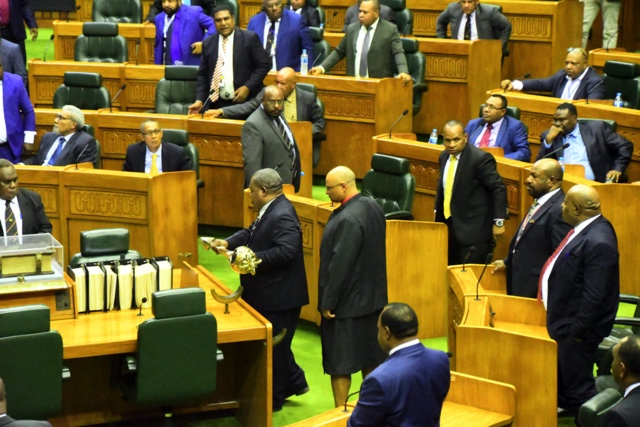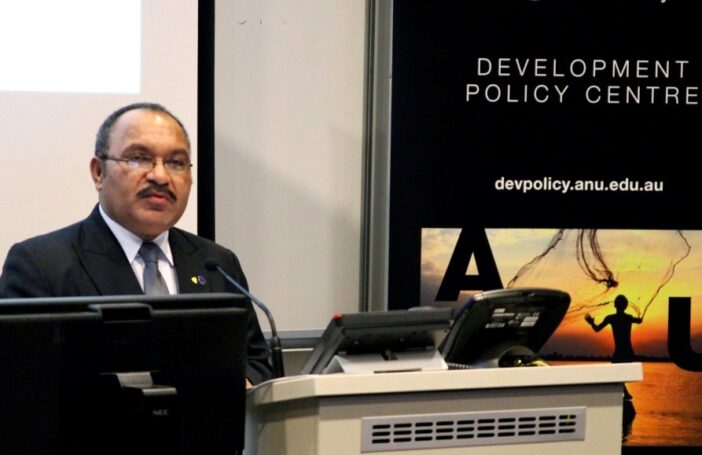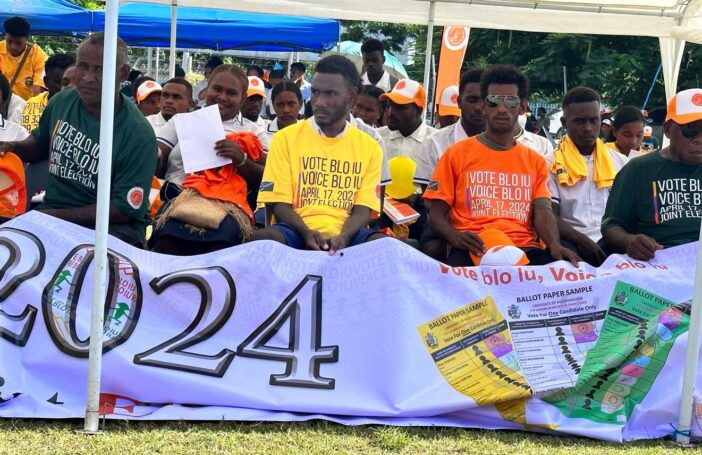The controversy surrounding Papua New Guinea’s Prime Minister Peter O’Neill’s alleged involvement in the ‘Parakgate’ affair continues. In a post published on this blog in early July, I provided a brief background of the issue. In particular, that post analysed the National Court’s decision on 01 July 2014, where it responded to four of the most important questions that underlie the current events:
- Was the arrest warrant against the Prime Minister valid?
- Should the court restrain the police from exercising the arrest warrant?
- Were the government officials and investigators ‘politically motivated’?
- Will the Prime Minister be free from any criminal liability if the legal bills are deemed to be valid?
In essence, the National Court of Papua New Guinea noted that: (1) the arrest warrant against the Prime Minister was valid; (2) the Court should not restrain the police from exercising a valid warrant; (3) the investigative officials were not ‘politically motivated’ and; (4) the Prime Minister may not be free from criminal liability even if the payment of the legal bills from the Paraka Lawyers is found to be valid.
This post gives an update on the three significant court cases that have happened since the National Court’s decision.
District Court’s Decision – 04 July 2014
Although the National Court was of the opinion that “there is a prima facia case in the interest of justice” against the Prime Minister, it recognises the Police Commissioner as having “ultimate control” of the proceedings (para 56).
Police Commissioner Vaki refused to effect the warrant to arrest the PM, insisting that he needed to review the investigation files. However, the Fraud office was reluctant to release the files to the Commissioner out of fear of its evidence being compromised.
Commissioner Vaki applied to the District Court to set aside the warrant, claiming that the National Court had recognised him as having “ultimate control” of the proceedings against the Prime Minister and that he needed to review the files before enforcing the warrant, which was initially issued by the District Court.
However, Chief Magistrate Eliakim rejected Commissioner Vaki’s argument, stating:
… the duty, if any, of the Office of the Police Commissioner to review the same investigation file is ‘functus officio’ and therefore cannot be reviewed by the same authority… In other words, the duty to assess whether or not a prima facia case is established has been executed by former Commissioner Kulunga (para 25, pg.26).
It was Chief Magistrate Eliakim that initially issued the warrant of arrest. Her Worship appeared to suggest that at the time of issuing the warrant she was satisfied by the evidence before her of a prima facia case justifying a warrant, and that the request was validly authorised by the former police commissioner, whose power in dealing with that warrant was exhausted when the warrant came into existence. According to Eliakim CM, this means that the new Commissioner does not have the power to withdraw that particular warrant. This is reiterated by the Supreme Court, which will be discussed later.
Supreme Court Decision – 30 July 2014
The Prime Minister immediately sought an appeal against the National Court decision but later withdrew, stating that he “will respect the decisions of the Police Commissioner in the handling of any investigation.” However, Finance Minister James Marape appealed the National Court decision and sought an injunction against the Fraud Office stopping them from arresting him.
Minister Marape’s Notice of Appeal raised “numerous errors alleged to have been made by the learned trial Judge” in the National Court (para 19). The Supreme Court appeared to agree with Minister Marape that “there may be serious issues to be tried” and allowed the appeal, and consequently granted the injunction (para 20, pp.35-6).
Although the Supreme Court did not expressly overrule the responses from the National Court concerning the four questions raised earlier, it appeared to raise doubts on the issue of the taxation of the legal bills (para 20). This means there is some uncertainty as to whether the validity of the bills would exonerate those implicated in the alleged fraud.
Supreme Court Decision – 02 October 2014
The Police Commissioner and the Prime Minister sought judicial review in the National Court of the decision of the Chief Magistrate to refuse his application to withdraw the warrant of arrest (pg.2). The Fraud Office also applied to the National Court to institute a criminal proceeding against the Police Commissioner for contempt of court for disobedience in enforcing the arrest warrant against the Prime Minister (pg.2). The National Court noted that these two proceedings raised significant constitutional questions and referred those questions to the Supreme Court for its interpretation. Section 18(2) of the PNG Constitution confers on the Supreme Court the original jurisdiction to hear any question that may arise in a court proceeding that requires an interpretation of the Constitution. The Supreme Court identified and responded to 16 questions, consolidating the two National Court proceedings (pg.11). I have summarised these questions into the following three main questions:
1. Can the Police Commissioner direct or exercise control over a member of the police force in the discharge of his or her function to lay, prosecute or withdraw charges in respect of an offence(s)?
The Police Commissioner argued in the affirmative. The Court upheld the Commissioner’s argument, stating:
The Police Commissioner, as head of the Police Force, which is a disciplined force, has an inherent and legitimate interest in the subject matter of all criminal investigations, including the issuance by the District Court of a warrant of arrest (pg.34).
Section 197(2) of the Constitution authorises the police force to “lay, prosecute or withdraw charges in respect of offences.” The provision cautions that, in exercising this function, members of the police force are not to be subjected to “direction or control by any person outside the Force.” While the Fraud officers may have argued that this include the actions of the Police Commissioner, whose actions may have the effect of interfering with their functions, the Court ruled that the police force is “not subject to direction or control by any person outside the Force, however, they are subject to direction or control by persons within the Force.”
Section 198 provides that the Commissioner is responsible for the “superintendence, efficient organisation and control” of the police force. According to the Court, that qualifies the Commissioner to exercise control within the Force as to whether any police officer should lay, prosecute or withdraw charges (see questions 1, 6, 7, 15, 16).
2. Can the Police Commissioner direct or exercise control over another member of the police force in the execution of a warrant of arrest issued by a Court of competent jurisdiction?
A critical issue that arises from the discussion of the first question is whether the Commissioner’s power to direct or exercise control over a member of the police force includes preventing or suppressing the execution of a validly issued warrant of arrest.
The Police Commissioner and the Prime Minister made three significant arguments. First, that the “execution of warrants of arrest is part and parcel” of the function of the police force and if the Commissioner has control over police functions, he has control over the execution of the warrant as a function of the police (pg.37). Second, that “the Commissioner can, at his discretion, decide that a warrant should not be executed or that its execution should be delayed.” They argued that the Commissioner has the power to give such an order “even to the member of the police force who applied for the warrant” (pg.37). Third, that “an arrest warrant is not a court order and should not be regarded as being the equivalent of a court order” (pg.38).
However, the Supreme Court rejected these arguments, stating: “We are not persuaded by those propositions …” (pg.41). While the Court “acknowledge(s) that there will be occasionally situations in which the recipient of a warrant will find it not appropriate or proper to execute a warrant …” it reasoned that “the nature of the obligation to execute the warrant will depend on the wording of the warrant” (pg.42). In this instance, the Supreme Court found that the wording of the warrant against the Prime Minister was not “simply an administrative authority for an arrest”, thereby giving some discretion to the Police Commissioner, but the wording is “mandatory”, making it “clear that the document is something more than an authorisation: it is an order, demanding obedience” (pg.44). This means that the Commissioner does not have the power to suppress or prevent the execution of a validly issued order in the form of an arrest warrant that demanded obedience. The Court made this clear:
Those words indicate that the court (District Court) – not just the informant (Fraud Officers) – has considered the matter and that the court considers it necessary – not just desirable – to arrest the Hon Peter O’Neill MP (pg.44).
The Supreme Court also referred to how “a reasonable person in Papua New Guinea would regard this warrant” and contended that a reasonable Papua New Guinean would see the warrant against the Prime Minister “as an order to arrest him and bring him before the court” (pg.45). With reference to the “notion of Rule of Law,” the Court seemed to suggest that the issuing of the warrant and adherence to its orders are essential “in the dispensation of justice and the enforcement of the law” in the country (pg.45).
While the Police Commissioner may have the power to direct or control the administrative functions of the police force, the Court made it clear that the “Commissioner has no power to direct a member of the Police Force not to comply with a court order, including an arrest warrant” (pg.46). This implies that the power of the Commissioner to control or direct the police force to lay, prosecute or withdraw charges in relation to an offence(s) ceases upon the issuance of a valid warrant. According to the Court, the only option that the Commissioner has in dealing with a warrant in such instance is to seek a judicial review, and until a judicial review decides otherwise, “the Commissioner has no unilateral power to withdraw,” delay or suppress the warrant (pg.51, 52).
3. Can the actions or inaction of the Police Commissioner constitute contempt of court?
Arguments as to whether the actions or inaction of the Police Commissioner may have amounted to contempt of court have been highly contentious since the start of this controversy. The sentencing of former Police Commissioner Sir Toami Kulunga early this year to seven months imprisonment made this an issue of great interest. The Court gave its verdict in these terms:
If a warrant of arrest, such as the warrant at the centre of these references, is expressed as a court order, then irrespective of any subsequent judicial determination as to its validity, the Commissioner of Police can be punished for contempt of court if he fails to execute the warrant or prevents its execution. If the warrant is an order, it must be obeyed unless and until it is set aside by another court order.
As discussed with regard to question two, the warrant is said to be an “order demanding obedience” (pg.44). There was no court order at the time that prevented its execution. The Fraud officers could therefore argue that the actions of the Police Commissioner in preventing its execution amounted to contempt of court. That argument is now before the National Court.
What happens now?
The case is now currently back with the National Court. The Supreme Court only provided the constitutional interpretation of the questions raised in these two National Court proceedings – the Commissioner’s application to seek judicial review on the validity of the arrest warrant and the contempt of court charges against the Commissioner. The opinion of the Supreme Court, however, is binding on the National Court and will have direct implications for these proceedings, and any other that may ensue in the coming months.
Conclusion
The Supreme Court’s decision was helpful in that it clears up confusion as to whether the Police Commissioner has the power to prevent the execution of the arrest warrant against the Prime Minister. If the Commissioner is found guilty of contempt of court and the judicial review affirms the arrest warrant order, it is likely that the Prime Minister may be taken in for questioning.
An uncertainty is whether the Prime Minister and the Minister for Finance will be exonerated of any criminal liability if the legal bills are found to be valid. A different court proceeding is underway to ascertain the validity of the legal bills. The Supreme Court, in hearing the appeal from the National Court, did not expressly uphold or dismiss Justice Kariko’s view that the validity of the legal bills would not exonerate any acts of criminality by the accused.
With these pending court cases, it is clear that in this ‘fight to the last breath’, there is still a very long way to go.
Bal Kama is a PhD Candidate at the College of Law, Australian National University.





